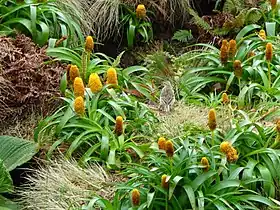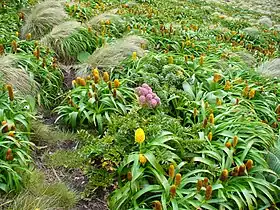Bulbinella rossii
Bulbinella rossii, commonly known as the Ross lily, is a species of flowering plant in genus Bulbinella. Despite its common name, it does not belong to the lily family Liliaceae. It is one of the subantarctic megaherbs. The specific epithet honours British Antarctic explorer James Clark Ross, who visited Campbell Island in December 1840. Bulbinella rossii is featured on the reverse of the current five dollar New Zealand banknote.
| Ross lily | |
|---|---|
 | |
| Ross lily in flower with New Zealand pipit | |
.jpg.webp) | |
| B. rossii as Chrysobactron rossii (Plate XLIV-XLV) | |
| Scientific classification | |
| Kingdom: | Plantae |
| Clade: | Tracheophytes |
| Clade: | Angiosperms |
| Clade: | Monocots |
| Order: | Asparagales |
| Family: | Asphodelaceae |
| Subfamily: | Asphodeloideae |
| Genus: | Bulbinella |
| Species: | B. rossii |
| Binomial name | |
| Bulbinella rossii | |
| Synonyms | |
| |
Description
Bulbinella rossii is a large, dioecious, perennial lily, growing up to 1 m in height and with a basal diameter of 40 mm. The dark green, fleshy, strap-like leaves are 0.6–1 m long and 15–60 mm wide. The inflorescence is a cylindrical raceme up to 600 mm long. The golden yellow flowers are densely crowded, 10–14 mm in diameter, and are often flushed with orange. The ovoid seed capsule is 10 mm long, containing narrowly winged, dark brown seeds. The plant flowers from October to January and fruits from December to March.[2]
Distribution and habitat
This species is endemic to New Zealand's subantarctic Auckland and Campbell Islands. There, it is common and widespread from sea level to the tops of the island mountains. Because it thrives where the ground has been disturbed, and because it is not particularly palatable to browsing animals, it is common near old human habitation sites and may form dense colonies in open herbfield and tussock grassland.[2]
Conservation status
The species is listed as "At Risk - Naturally Uncommon" in the most recent (2018) assessment using New Zealand Threatened Classification for plants, because of its restricted range.[1]

References
Notes
- Lange, Peter J. de; Rolfe, Jeremy R.; Barkla, John W.; Courtney, Shannel P.; Champion, Paul D.; Perrie, Leon R.; Beadel, Sarah M.; Ford, Kerry A.; Breitwieser, Ilse; Schönberger, Ines; Hindmarsh-Walls, Rowan (May 2018). "Conservation status of New Zealand indigenous vascular plants, 2017" (PDF). New Zealand Threat Classification Series. 22: 42. OCLC 1041649797.
- New Zealand Plant Conservation Network
Sources
- "Bulbinella rossii". line. New Zealand Plant Conservation Network. 2010-04-06. Retrieved 2011-01-25.
